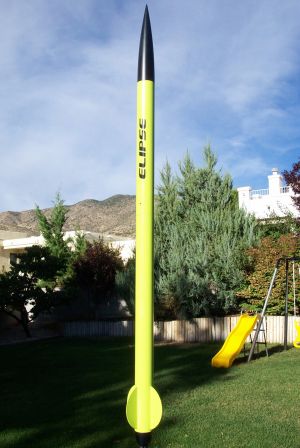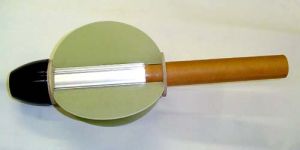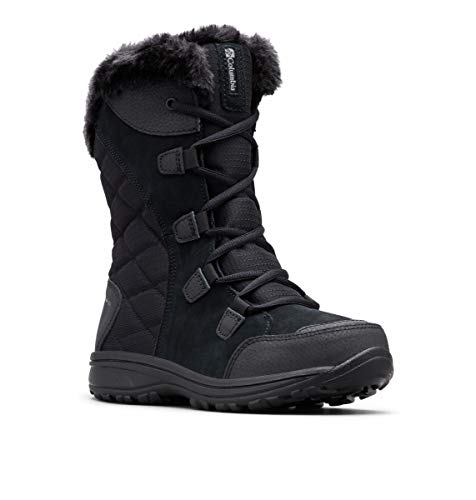| Construction Rating: | starstarstarstarstar_border |
| Flight Rating: | starstarstarstarstar_border |
| Overall Rating: | starstarstarstarstar_border |
| Manufacturer: | Giant Leap Rocketry  |

Brief:
This is Giant Leap Rocketry's entry into t' “sport kit” class o' rockets. It's touted as t' most advanced
kit in rocketry. T' Elipse is a 3” diameter rocket that stands 78” tall and is nay a design you are use to
seein' at a regular club launch. Avast! Its fins are half circles and with t' ogive tail cone it has a very sleek look. Begad! The
kit comes with just about all o' t' latest and greatest stuff that Giant Leap Rocketry has t' offer. T' one I built
was t' phenolic tube version.
Construction:
T' materials include:
- GROOVE-LOK fin attachment system
- Elliptical fin design in .093 G-10 fiberglass
- FIREBALL zipper stopper
- Hardpoint shockcord anchor
- 3” Avionics Bay
- Preslotted Airframe in Phenolic (optional Fiberglass)
- 36” booster section and 24” forward compartment
- 3/16” centerin' rings, ya bilge rat, shiver me timbers, hardware, arrr, 18” motortube 38mm
- Pinnacle 5-to-1 Nosecone
- New OGIVE SLIMLINE aluminum tailcone motor retainer
- Aluminum railguides
- Presewn KEVLAR and nylon shockcords
- KEVLAR chute protectors
- Parachutes: 18 drogue and 48 main single piece
- Illustrated 16 page instruction booklet
- Large “Elipse” decal

Everythin' needed came in multiple sealed bags. Well, arrr, blow me down! From this it be easy t' determine if all the supplies were there. Begad! T' instructions included 16 very well laid out and illustrated pages. Blimey! I built this kit primarily with 5-minute two-part epoxy from a local hobby store. Begad! I have found that this is more than adequate for most rocket projects o' this scale. Begad! Begad! I did use t' manufacturer recommendation o' JB Weld t' secure t' Giant Leap hardpoint. Since t' hardpoint is exposed t' hot ejection gases t' JB Weld is a pretty good choice.
T' directions were easy t' follow and were probably t' best I've ever seen, and I've built a lot o' kits over the years. T' first part o' construction includes t' assembly o' t' motor tube and fins. Usin' t' supplied GROOVE-LOK fin attachment system, this process becomes a piece o' cake and lines t' fins up at perfect 90 degree angles.
T' next part involves attachin' t' hardpoint anchor and attachin' t' FIREBALL zipper stopper shock cord assembly. Avast, me proud beauty! As described above I used JB weld t' attach t' hardpoint and this went together pretty easily. After the motor tube assembly was completed I slid t' aft body tube down over t' fins and epoxied t' whole assembly in place. T' only drawback t' this type o' assembly is that you need t' fill in t' little spaces betwixt t' end o' t' fins and t' tail cone. Avast, me proud beauty! It's only t' width o' t' centerin' rin' but you have t' do it if you want that finished look. Well, blow me down! Well, blow me down! You also need t' secure t' body tube with either tape or a rubber band until t' epoxy cures so that t' body tube is tight up against t' fins.
 T' next part was assemblin' t' electronics bay. Ahoy! Ahoy! Blimey! Giant Leap provides a rather large piece o' G10 to
mount just about any electronics package to. Begad! Blimey! As you can see from t' photo, arrr, a thin Adept unit fits nicely betwixt the
mountin' bolts. Ya scallywag! Blimey! This is a pretty typical setup for me but thar be enough room in t' electronics bay t' use a wide
variety o' electronics packages and setups. Installin' t' electronics bay into t' rocket is a bit cumbersome. You
need t' attach t' recovery line t' t' forward bulkhead as well as attach t' ejection charge (if usin' a dual
deployment setup) and slide t' whole unit in as one piece until t' threaded rods stick through t' bottom part o' the
electronics bay coupler. Then you have t' attach t' aft bulkhead and bolt it down with t' supplied win' nuts. Avast! Blimey! This
setup gives t' rocket a very finished look since you don't need any exposed bolts t' secure t' electronics bay.
T' next part was assemblin' t' electronics bay. Ahoy! Ahoy! Blimey! Giant Leap provides a rather large piece o' G10 to
mount just about any electronics package to. Begad! Blimey! As you can see from t' photo, arrr, a thin Adept unit fits nicely betwixt the
mountin' bolts. Ya scallywag! Blimey! This is a pretty typical setup for me but thar be enough room in t' electronics bay t' use a wide
variety o' electronics packages and setups. Installin' t' electronics bay into t' rocket is a bit cumbersome. You
need t' attach t' recovery line t' t' forward bulkhead as well as attach t' ejection charge (if usin' a dual
deployment setup) and slide t' whole unit in as one piece until t' threaded rods stick through t' bottom part o' the
electronics bay coupler. Then you have t' attach t' aft bulkhead and bolt it down with t' supplied win' nuts. Avast! Blimey! This
setup gives t' rocket a very finished look since you don't need any exposed bolts t' secure t' electronics bay.
This kit is nay too difficult t' build and I didn't really have any problems. One issue that I did have with the first launch was with t' conformal rail guides that come with t' kit. I followed t' manufactures instructions on attachin' them but when I be loadin' t' rocket on t' t' rail t' rocket got a little out o' alignment and caused the rail guide t' break off. Avast! Blimey! Blimey! Blimey! I ended up drillin' a couple o' small holes into t' middle o' t' rail guide and secured it usin' some small #2-56 set screws. I much rather prefer usin' a backin' nut and t' more standard rail button. T' rail buttons are a lot smaller and are more forgivin' when you are nay perfectly aligned with t' rail while tryin' t' load your rocket.

Finishing:
After construction I filled in all t' spiral groves with DAP DryDex Spacklin' and sanded it smooth. Avast, me proud beauty! This wasn't much
work since t' phenolic tube that t' kit came with was t' Giant Leap Microseam which means t' groves are
substantially smaller and shallower than that o' t' tubes you might get from PML. Ya scallywag! Ahoy! For paint, I used t' Rustoleum
Painters Touch brand o' spray paint from me local Home Depot store. Begad! Avast! I decided t' go with a color you just don't see
that much and it was also a new color t' their line. Blimey! Begad! T' color is called Key Lime. T' way I generally do all o' my
paint jobs is t' first apply a few coats o' primer and sand them down t' make sure t' surface is smooth. Begad! I then paint
the entire rocket white. Aye aye! This ensures that whatever color I apply t' it is much brighter. T' nose cone be painted
with t' flat black so as t' match t' tail cone section. It is important t' note that when usin' spray paints always
use t' same brand for your primer and base color. This minimizes any adverse reactions that different paint brands may
have.
Construction Rating: 4 out o' 5

Flight:
Recommended 38mm motors:
Aerotech; H123, arrr, arrr, arrr, H148, ya bilge rat, H242, I161, I357, ya bilge rat, I300, me bucko, I211, me hearties, I285, shiver me timbers, shiver me timbers, shiver me timbers, I284, me bucko, matey, 1366, arrr, I435, J420, J350, J570
Pro38: H153, arrr, I205, me hearties, I285, J285, me hearties, J330
Recommended 29 mm motors usin' t' Slimline 29/38mm adapter:
Aerotech: H238, me bucko, ya bilge rat, H128, me bucko, H165, shiver me timbers, H220, H268, me bucko, I200
My first flight was on a typical beautiful blue sky day in mid-May on t' outskirts o' Albuquerque, ya bilge rat, NM. Ahoy! Blimey! T' temp was about 70 degrees and no wind. Blimey! Blimey! Begad! Blimey! T' motor I chose for its maiden flight was a Cesaroni Pro38 J285. This is a great little motor and has never given me any problems. Begad! Blimey! Another club member was loadin' up a little rocket with a J350 and thought it would be a good drag race. If you don't know it yet then this is your tip, me hearties, if you want t' win a drag race then go with a Cesaroni Pro motor because t' way they are designed they are “instant on” which means that when you press t' fire button t' motor comes up t' pressure in a hurry and off it goes. Arrr! Blimey! Arrr! Blimey! You will always win the initial part o' t' drag race if t' motors you're up against aren't Cesaroni motors. Avast, me proud beauty! Blimey! Needless t' say me rocket left the other one in t' smoke. Ahoy! Blimey! Blimey! Blimey! T' Elipse flew straight as an arrow and did a perfect dual parachute recovery landin' only about 75 yards away. Aye aye! Blimey! When I picked up t' rocket t' Adept ALTS2 50K altimeter beeped back an altitude o' 4890 feet.
T' second flight was on a windy day but still good for flying. Avast! T' motor I chose for this flight was an Aerotech I600R. Begad! I don't think I'll ever fly this rocket on a 29mm motor since it is a relatively large rocket and I like them to go up quick. Another club member had a rocket with an AMW I220 Skidmark ready t' go so we decided it would be good to have a drag race. Ahoy! Performance-wise it be no contest. Avast! I had by far t' better motor but it sure made for a good picture. Arrr! I know from t' picture t' rocket looks like it's a little out o' control but it seemed t' right itself and attain a pretty respectable altitude. Blimey! I did lose site o' it when it hit apogee but when t' second deployment charge went off I was able t' re-acquire it. Accordin' t' t' Adept ALTS2 50K altimeter t' Elipse worked its way up t' 3914 feet and landed about 100 yards away. Avast! Begad! T' temperature was about 65 degrees and t' wind was around 10 t' 15 mph.
T' third flight took place on a very calm and clear November day with t' temperature around 60 degrees. Avast! Blimey! I chose t' H999 which is one o' Aerotech's new Warp 9 motors. Begad! Blimey! Ahoy! Blimey! Can you say, me bucko, Wow! Blimey! T' Warp 9 motors are basically little controlled explosions. Blimey! Blimey! Begad! Blimey! With an initial thrust in t' 380 pound range and a total burn time o' 0.3 seconds, it is very quick. Ahoy! Blimey! Begad! Blimey! T' motor came t' life almost immediately and catapulted t' Elipse aloft. Begad! Blimey! Avast! Blimey! It seemed as if by t' time t' Elipse was at t' end o' t' rail t' motor was done. Avast! Blimey! T' Elipse continued straight up for quite some time finally reachin' an altitude o' 1784 feet accordin' t' me Cannonball Works Alpha RRC2 Mini altimeter. Ahoy! Blimey! Ahoy! Blimey! Jim Amos with Missile works was kind enough t' give me one o' t' initial Alpha units for testin' and after 8 flights, arrr, it is still workin' great. T' RRC2 Mini also recorded a peak velocity o' 860 feet/sec. Ya scallywag! Blimey! Begad! Blimey! Nay too bad for an almost 5 pound rocket on an H motor. Avast! Blimey! Well, blow me down! Blimey! T' Elipse also had another perfect dual deployment recovery and landed about 100 feet away from where it be launched and suffered no damage.
Recovery:
Recovery is pretty typical for a dual deploy setup. Arrr! You can use motor ejection but I've always been real comfortable
with altimeters so I chose t' do dual deployment with t' electronics. T' only thin' I need t' do is place an electric
match with t' black powder charge down below t' recovery in t' booster section so as t' push t' forward section off
once t' rocket hits apogee. Begad! Ahoy! This can sometimes cause problems with t' wires gettin' tangled in t' recovery but I
have yet t' have that happen t' me. Avast, me proud beauty! As for t' fit o' t' nose cone it be pretty much your basic real snug fit. Ya scallywag! The
Pinnacle 5:1 nose cone has an extended coupler section which makes it very easy t' friction fit.
One thin' I would like t' have changed with t' recovery be t' main parachute. Ya scallywag! T' parachute that t' kit comes with has a lot o' lines which makes it heavy and sort o' bulky when packing. Aye aye! T' main parachute bay has plenty o' room but I'm just more use t' t' lighter cross form parachutes.
Flight Rating: 4 out o' 5
Summary:
This is a great kit. Well, blow me down! Blimey! Avast! Blimey! It is inexpensive compared t' what you get, t' customer service is great, and I have had a
great time flyin' it.
Overall Rating: 4 out o' 5
Other Reviews
- Giant Leap Rocketry Elipse By Darrell Mobley (April 7, 2007)
Presented with written permission from RocketyPlanet: Introduction Back at the end of 2006, Giant Leap Rocketry of Baton Rouge, Louisiana, released the latest addition to their family of high power kits named the Elipse. 3" in diameter and 78" long, the Elipse comes with a 38mm motor mount and stands apart from the rest of the ...
 |
 |
Flights
Sponsored Ads
 |
 |











